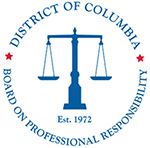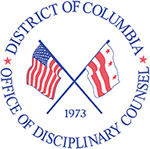- For the Public
- For Lawyers
- Board on Professional Responsibility
- Office of Disciplinary Counsel
- Disciplinary Decisions
-
Attorney Discipline News
- Administrative Order 2020-8: Live Streams of Hearing Committee Proceedings
- Administrative Order 2023-1: Return to In-Person Proceedings
- The Court of Appeals Makes Appointments to the Board on Professional Responsibility
- Amendments to the Rules of the Board on Professional Responsibility
- Amendments to the Rules of the Board on Professional Responsibility
- Volunteer Opportunities
From Washington Lawyer, October 2015
By Joe Perry
What the Constitution demands and what the Rules of Professional Conduct require are two separate matters. The District of Columbia Court of Appeals visited this distinction in the recent disciplinary case of In re Kline,[1] which addressed the scope of Rule 3.8(e).[2]
The underlying criminal case in Kline involved the drive-by shooting of Christopher Boyd. The prosecutor in the case took notes on an interview with a Metropolitan Police Department officer who was first on the scene after Boyd was shot. The officer told the prosecutor that during an initial interview with Boyd at the hospital, Boyd told the officer that he did not know who shot him.[3]
Arnell Shelton was charged with felony assault in connection with the shooting. During discovery, counsel for the defense "requested discovery pursuant to Brady and specifically sought 'prior inconsistent [or] non-corroborative' statements by witnesses and 'any other information, which . . . impeaches a witness' testimony.'"[4] The prosecutor stated "that the government was not 'in possession of any truly exculpatory information.'"[5] He did not turn over the notes from his interview with the officer, or otherwise convey what Boyd had said in the hospital, then or at any other time.
At Shelton's first trial, the government's case "hinged" on Boyd, Boyd's mother, and a third eyewitness identifying Shelton as the shooter.[6] For the defense, Shelton's wife testified that Shelton was at home at the time of the shooting. The jury did not reach a verdict, and a mistrial was declared.[7]
Thereafter, the prosecutor left the U.S. Attorney's Office and a new assistant U.S attorney assigned to the case forwarded to Shelton's counsel the notes on Boyd's statement at the hospital. A new trial was held and Shelton was convicted despite disclosure of the statement.
Throughout the subsequent disciplinary hearing, Andrew Kline maintained that he had not committed misconduct by failing to turn over information on Boyd's hospital statement. The court rejected his reasoning:
- Kline argued, inter alia, that he did not violate Rule 3.8(e) because his ethical duties are coextensive with the duties imposed under Brady v. Maryland . . . Specifically, Kline relies on the "material-to-outcome" standard recognized by the United States Supreme Court in Brady's progeny to argue that a prosecutor cannot violate Rule 3.8(e) unless there is a reasonable probability that the information or evidence withheld made a difference in the outcome of trial. We hold that Kline's interpretation of Rule 3.8(e), which incorporates a retrospective materiality analysis, is not the appropriate test for determining whether a prosecutor has violated Rule 3.8(e). We also hold that Bar Counsel proved by clear and convincing evidence that Kline intentionally failed to disclose information in violation of the rule. However, we conclude that given the confusion regarding the correct interpretation of a prosecutor's obligations under the rule, sanctioning Kline would be unwarranted.[8]
In general, the court put prosecutors on notice that it will not tolerate the suppression of evidence that the prosecutor knows or reasonably should know tends to negate the guilt of the accused, irrespective of whether such evidence would have made a difference at trial.[9]
The court advised that future violations of Rule 3.8(e) would likely result in suspensory sanction now that the court has provided clear guidance.[10]
The court's holding that a prosecutor's ethical obligations reach beyond Brady materiality requirements dovetails with one of the purposes of its disciplinary system: to protect the integrity of the legal profession.
Irrespective of whether the suppression of information was material to Shelton's conviction, that suppression is undoubtedly material to the public's perception of the criminal justice system, and the court's interpretation of Rule 3.8(e) will help guard against a loss of public faith in those who prosecute offenses.[11]
Joe Perry serves as assistant bar counsel in the Office of Bar Counsel.
Notes
[2]Rule 3.8(e) provides that a prosecutor in a criminal case shall not "[i]ntentionally fail to disclose to the defense, upon request and at a time when use by the defense is reasonably feasible, any evidence or information that the prosecutor knows or reasonably should know tends to negate the guilt of the accused or to mitigate the offense, or in connection with sentencing, intentionally fail to disclose to the defense upon request any unprivileged mitigating information known to the prosecutor and not reasonably available to the defense, except when the prosecutor is relieved of this responsibility by a protective order of the tribunal[.]"
[9]The court found no reason to disturb the findings by the Hearing Committee and the Board on Professional Responsibility that Kline withheld the interview notes because he did not believe they were exculpatory. 113 A.3d at 214.
[10]The court stated: "In so concluding, we are also taking into consideration no companion violations were charged, no allegations of dishonesty were made, the respondent has a clean disciplinary record, and similar conduct will incur sanctions comparable to that recommended by the BPR in this case now that this court has provided clear guidance on the scope of a prosecutor's disclosure obligations under Rule 3.8." 113 A.3d at 216. The Board had recommended a 30-day suspension in the Kline matter. Id. at 204.
[11]See, e.g., In re Howes, 52 A.3d 1, 21 (D.C. 2012) ("The fair administration of justice relies, in large part, upon the integrity, honesty and trustworthiness of prosecutors, and where misconduct causes a prosecutor's ethics to be questioned, the entirety of the criminal justice system is called into question.")
Disciplinary Actions Taken by the Board on Professional Responsibility Hearing Committees on Negotiated Discipline
IN RE ATHANASIOS BASDEKIS. Bar No. 463692. July 24, 2015. The Board on Professional Responsibility Hearing Committee Number Nine recommends that the D.C. Court of Appeals accept Basdekis's petition for negotiated discipline and suspend him for 18 months, stayed in favor of unsupervised probation with conditions for violations of Rules 1.1(a), 1.1(b), 1.3(a), 1.3(b)(1), 1.4(a), and 3.2(b).
Disciplinary Actions Taken by the District of Columbia Court of Appeals
Original Matters
IN RE BRYNEE K. BAYLOR. Bar No. 475406. July 30, 2015. The D.C. Court of Appeals disbarred Baylor by consent, effective immediately.
IN RE RICHARD A. KASSEL. Bar No. 441839. July 30, 2015. The D.C. Court of Appeals disbarred Kassel by consent, effective immediately.
IN RE VICTOR MBA-JONAS. Bar No. 452042. July 2, 2015. The D.C. Court of Appeals denied Mba-Jonas's petition for reinstatement.
Reciprocal Matters
IN RE ANDREW J. BRAUER. Bar No. 497812. July 23, 2015. The D.C. Court of Appeals suspended Brauer pursuant to D.C. Bar R. XI, § 13(e), based upon a certified order changing Brauer's status to practice law in the state of North Carolina to disability inactive and staying the resolution of his pending disciplinary grievances.
IN RE HAROLD J. PICKERSTEIN. Bar No. 435206. July 23, 2015. In a reciprocal matter from Connecticut, the D.C. Court of Appeals imposed functionally equivalent reciprocal discipline and suspended Pickerstein for five years with fitness. In Pickerstein's resignation from the practice of law in the state of Connecticut, he conceded that there were sufficient facts to find he had misappropriated client funds.
IN RE ROBERT SEGUIN. Bar No. 938449. July 23, 2015. In a reciprocal matter from New Jersey, the D.C. Court of Appeals imposed identical reciprocal discipline and disbarred Seguin. In consenting to disbarment in New Jersey, Seguin acknowledged that he had knowingly misappropriated client funds from his attorney trust account.
IN RE MARK A. SGARLATA. Bar No. 418557. July 23, 2015. In a reciprocal matter from Virginia, the D.C. Court of Appeals imposed functionally equivalent reciprocal discipline and disbarred Sgarlata. Virginia revoked Sgarlata's license to practice law based upon his conviction of two counts of aggravated involuntary manslaughter while under the influence of alcohol.
IN RE HERBERT J. TAN. Bar No. 496860. July 23, 2015. In a reciprocal matter from New Jersey, the D.C. Court of Appeals imposed functionally equivalent reciprocal discipline and suspended Tan for one year with fitness. In New Jersey, Tan was found to have engaged in misconduct, including dishonesty and repeated conflicts of interest.
Interim Suspensions Issued by the District of Columbia Court of Appeals
IN RE ALLISON M. BLACK MCIVER. Bar No. 480248. July 15, 2015. Black McIver was suspended on an interim basis based upon her conviction in the State Court of Gwinnett County, Georgia, of unlawful practice of law, a "serious crime" within the meaning of D.C. Bar Rule XI, § 10(b).
IN RE MARC H. HOFFMAN. Bar No. 963538. July 2, 2015. Hoffman was suspended on an interim basis based upon discipline imposed in Florida.
IN RE KRISTAN L. PETERS. Bar No. 415989. July 2, 2015. Peters was suspended on an interim basis based upon discipline imposed in the U.S. District Court for the Southern District of New York.
IN RE ROBERT L. SHIELDS JR. Bar No. 463074. July 1, 2015. Shields was suspended on an interim basis based upon discipline imposed in Maryland.
Informal Admonitions Issued by the Office of Bar Counsel
IN RE CHRISTINA DELA ROSA. Bar No. 1003817. May 26, 2015. Bar Counsel issued dela Rosa an informal admonition. While working as an attorney for a solo practitioner with an elder law practice, dela Rosa falsely reported to the attorney she worked for that she had returned items purchased on behalf of a ward and falsely reported that she had lost the receipt for the returned items and that the store could not reproduce the receipt. The attorney relied on the false statements in a pleading to the court. Rule 8.4(c).
The Office of Bar Counsel compiled the foregoing summaries of disciplinary actions.
Informal Admonitions issued by Bar Counsel and Reports and Recommendations
issued by the Board on Professional Responsibility are posted at
www.dcattorneydiscipline.org. Most board recommendations as to discipline are
not final until considered by the court. Court opinions are printed in the Atlantic Reporter and also are available online for decisions issued since August 1998. To obtain
a copy of a recent slip opinion, visit www.dccourts.gov/internet/opinionlocator.jsf.
- For the Public
- For Lawyers
- Board on Professional Responsibility
- Office of Disciplinary Counsel
- Disciplinary Decisions
-
Attorney Discipline News
- Administrative Order 2020-8: Live Streams of Hearing Committee Proceedings
- Administrative Order 2023-1: Return to In-Person Proceedings
- The Court of Appeals Makes Appointments to the Board on Professional Responsibility
- Amendments to the Rules of the Board on Professional Responsibility
- Amendments to the Rules of the Board on Professional Responsibility
- Volunteer Opportunities

- Board on Professional Responsibility
- 430 E Street NW
- Suite 138
- Washington, DC 20001
- Phone: 202-638-4290
- Fax:

- Office of Disciplinary Counsel
- District of Columbia Court of Appeals
- 515 5th Street, NW
- Building A, Suite 117, Washington, DC 20001
- Phone: 202-638-1501
- Fax: 202-638-0862

